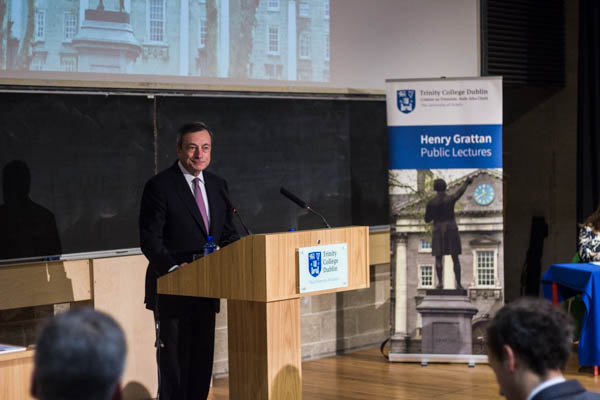President of the European Central Bank (ECB) Mario Draghi’s visit to Trinity marked his first-ever visit to the country in his term, which started during the economic crisis in 2011. In his speech, he championed further European integration as a means of easing high youth unemployment rates in member states.
A suited audience listened to Draghi deliver a composed, fact-heavy speech on a markedly uncontroversial topic, “Youth unemployment in the euro area”, in a talk that made it easy to see why he was once labelled the “most German of all remaining candidates” by a German newspaper in their endorsement of him for the role in 2011. For years, Ireland has hoped for a visit from one of the most powerful individuals in Europe.
Combining the ECB Youth Dialogue series and the Henry Grattan lecture, his talk on youth unemployment, however, was sure to be of interest to the students in the audience, who participated in round-table talks with the President of the ECB directly after the talk.
Prominent Irish economists Prof Philip Lane and Prof Patrick Honohan, who have also given Henry Grattan lectures, were in attendance. Lane, a Trinity academic, is the current governor of the Irish Central Bank, while Honohan is the former governor.
Draghi used the Book of Kells to illustrate his point about the importance of the knowledge economy in Europe, saying the book represented the importance of “nurturing knowledge, spreading it around the world and protecting it”.
Overall, his message was clear: a higher level of labour mobility and increased integration among EU member states could go far to ease high youth unemployment rates.
Many of the problems that cause youth unemployment do not stem purely from the economic downturn, he contended, and these systemic problems need to be addressed if we are to move forward: “Cyclical unemployment can turn structural if people are unemployed for a long time.”
Although much of his address focused on figures of youth unemployment and the economic reasons behind this, he shared sympathy with young people, stating that there is a more fundamental reason than just an economic one to address this problem as a matter of urgency. Hinting at current political turmoil, he said: “The weight of the crisis has fallen disproportionately on young people, leaving a legacy of anger and mistrust in the values of our society and the identity of our democracy.”
Sending out a positive message to young people in the audience, he said that “when it comes to creativity, age plays a crucial role”. He explained how this level of creativity decreases with age, proving the importance of recruiting young people in any business. High levels of youth unemployment not only negatively impacts young people’s lives, it impacts experienced workers who can learn a lot and open their minds more with the presence of young people, he said.
Commending many already-existing European policies, most notably Erasmus, Draghi said that “Europe can contribute by investing” more in these programmes and do more to increase labour mobility. This increase in labour mobility, he said, is inevitable.
Draghi called for “specific policies” to be adopted in countries where youth unemployment is particularly high, using examples of Spain – a country renowned for its extreme youth unemployment rates – among others. Of his own country, Italy, where he served as the Governor of the Bank of Italy, he noted begrudgingly that it does not perform much better in this area. Upon his appointment as President of the ECB in 2011, Draghi sent a letter to the Italian government with the former president, Trichet, imploring the country to introduce certain economic policies to improve their declining economy.
The Henry Grattan lectures, run since 2011 by the School of Social Sciences and Philosophy, give the public access to engage with leading academics and policy-makers from around the world. Draghi’s landmark visit is in line with a European focus in the lectures, with previous visitors including former chairman of Goldman Sachs and UN Special Representative for International Migration Peter Sutherland and EU Ambassador to the US David O’Sullivan.
Draghi’s visit marks a turning point in Ireland’s rocky relationship with the ECB, with Draghi’s predecessor Trichet sending an infamous letter forcing Ireland to accept a bailout deal or else emergency funding would be pulled from the country. Then, in 2014, Draghi refused to take part of the banking inquiry here, which left politicians aghast at what they saw as disdain from the ECB.
Now, three years later, relations seem to have thawed as Ireland has made something of a recovery. Nevertheless, questions from the audience were not taken after Draghi’s short lecture. He did, however, answer questions from the moderator, one of which was about the rise of real estate prices, which he attributed to “local” and “not systemic” problems for many cities in Europe. Responding to a question about the influence of academic research on monetary policy, Draghi reassured the audience, which comprised many prominent economics academics, that it is “heavily influenced” by academic research, detailing the influence academia had had on the Great Depression and the economic downturn in the 1970s.







